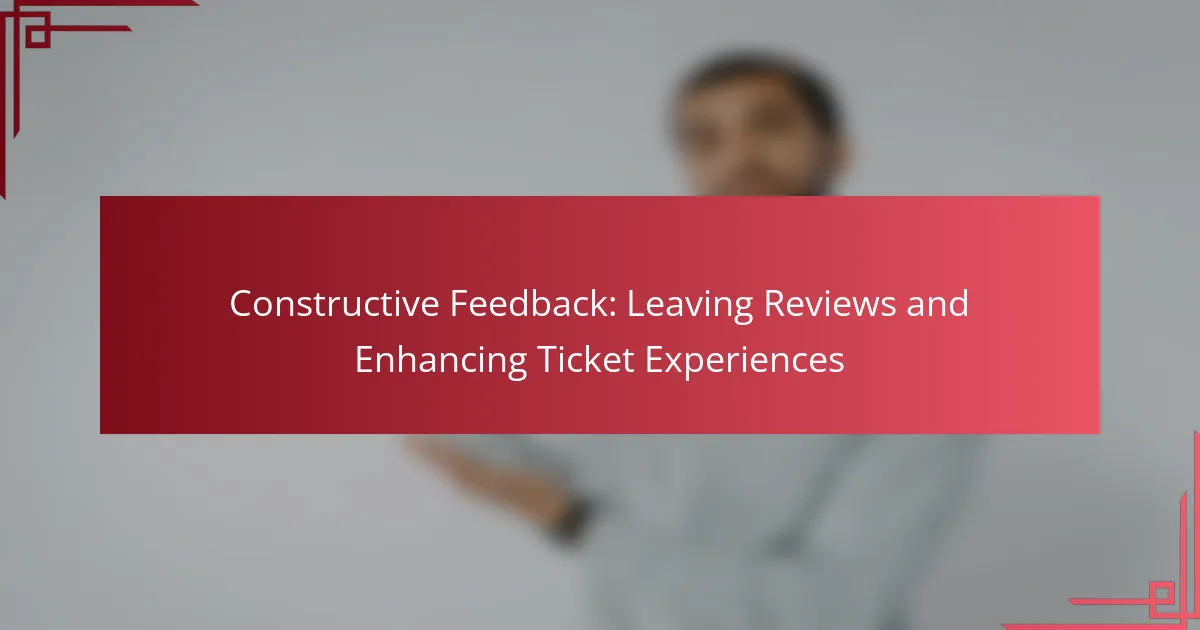Leaving reviews plays a crucial role in enhancing ticket experiences by offering valuable feedback to event organizers and venues. Constructive feedback, when clear and specific, not only aids in improving services but also fosters a positive environment for growth. Online platforms facilitate this process, allowing users to share their insights and contribute to the overall quality of events.
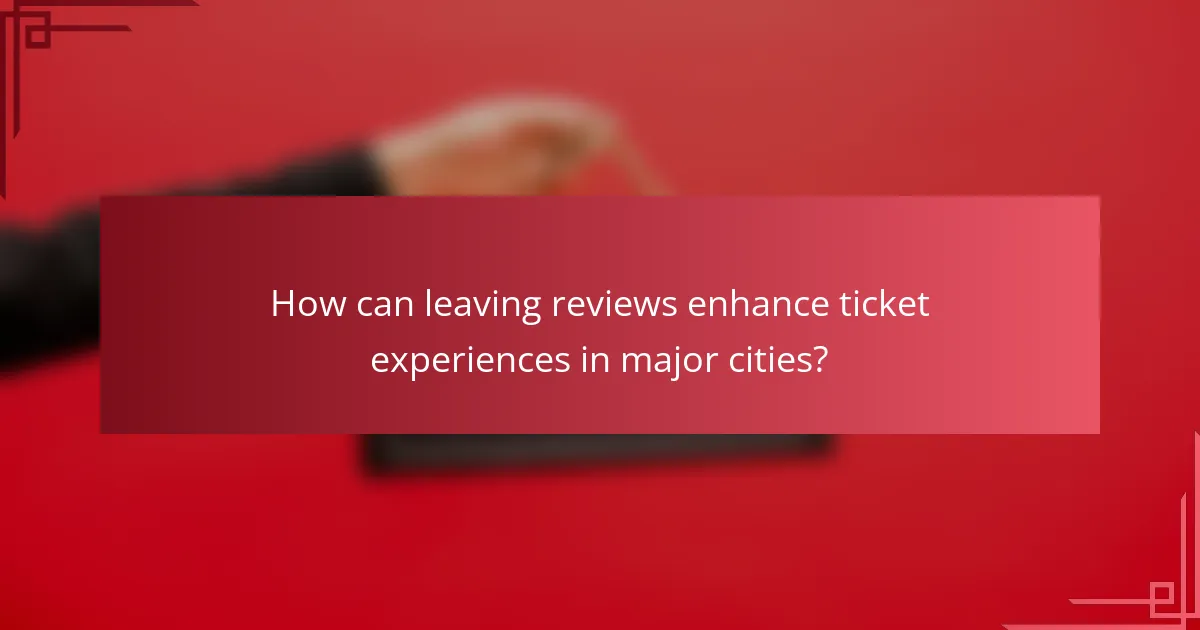
How can leaving reviews enhance ticket experiences in major cities?
Leaving reviews can significantly enhance ticket experiences in major cities by providing valuable feedback to event organizers and venues. These insights help improve services, increase the quality of events, and ensure better management of venues, ultimately leading to a more enjoyable experience for attendees.
Improved customer service
When patrons leave reviews, they highlight specific aspects of customer service that may need attention. Positive feedback can reinforce good practices, while constructive criticism can guide staff training and operational improvements. For instance, if multiple reviews mention slow service at a concession stand, management can address this issue to enhance the overall experience.
Additionally, venues can respond to reviews, showing that they value customer input. This interaction fosters a sense of community and encourages more attendees to share their experiences, further refining service quality.
Increased event quality
Reviews often reflect the quality of the events themselves, influencing future programming decisions. Organizers can analyze feedback to understand what types of performances or activities resonate most with audiences. For example, if concert-goers consistently praise a particular genre or artist, organizers may prioritize similar acts in future lineups.
Moreover, honest reviews can help set realistic expectations for potential attendees. When reviews detail both the highs and lows of an event, newcomers can make informed decisions about their attendance, leading to a more satisfied audience overall.
Better venue management
Feedback from reviews can guide venue management in making strategic improvements. For example, if patrons frequently mention issues with seating arrangements or accessibility, venue operators can take steps to address these concerns. This proactive approach not only enhances the experience for current attendees but also attracts future visitors.
Furthermore, venues can use aggregated review data to identify trends over time. By analyzing patterns in customer feedback, management can make informed decisions about renovations, staffing, and event scheduling, ensuring that the venue remains competitive and appealing in a bustling city environment.
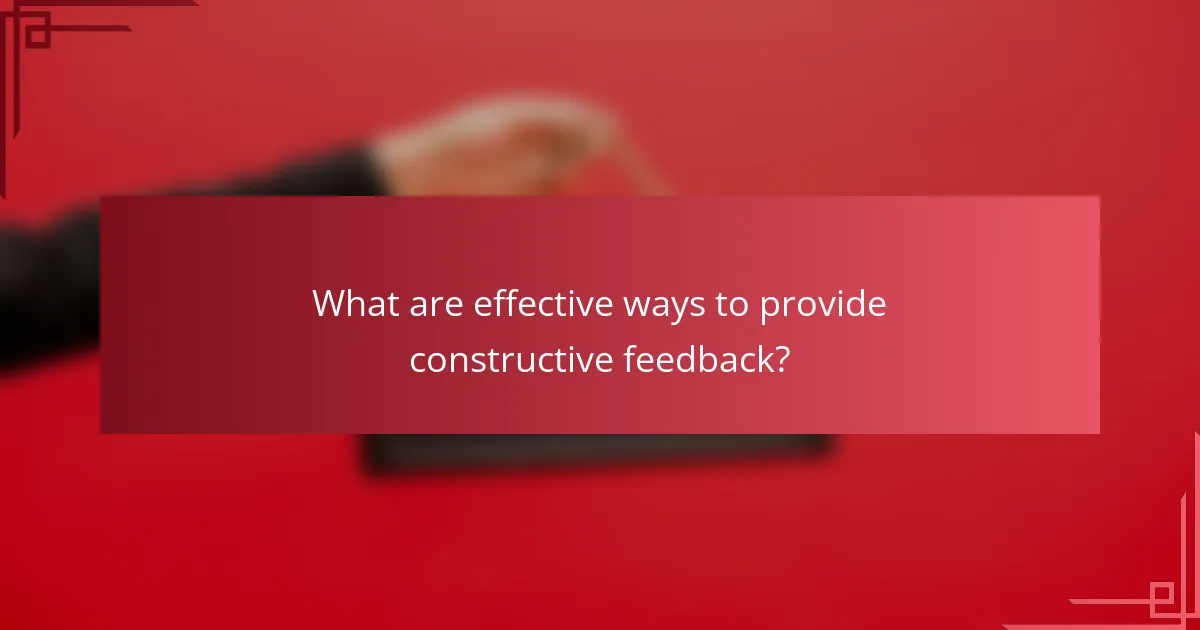
What are effective ways to provide constructive feedback?
Effective constructive feedback involves being clear, specific, and focused on improvement. This approach not only helps the recipient understand the message but also encourages a positive response and fosters growth.
Be specific and detailed
When providing feedback, clarity is key. Instead of vague statements like “this was not good,” specify what aspects were lacking, such as “the response time was slow, taking over 10 minutes.” This helps the recipient understand exactly what needs improvement.
Include examples to illustrate your points. For instance, if a ticket response was unclear, you might say, “The instructions provided were confusing, particularly in step 2, where it mentioned ‘click here’ without a link.” This level of detail makes your feedback actionable.
Use a positive tone
A constructive tone can significantly influence how feedback is received. Start with positive observations before addressing areas for improvement. For example, “I appreciate the effort put into the ticket response, but there are some areas we can enhance.” This approach creates a more receptive environment.
Using encouraging language can also motivate the recipient to take action. Phrases like “I believe you can improve this by…” or “With a few adjustments, your responses will be even better” can inspire confidence and willingness to adapt.
Focus on actionable suggestions
Feedback should always include practical steps for improvement. Instead of merely pointing out issues, provide clear recommendations. For example, suggest, “Consider using bullet points for clarity in your responses,” which gives a straightforward way to enhance communication.
Additionally, prioritize suggestions based on impact. Highlight the most critical changes first, such as improving response times, followed by less urgent adjustments. This helps the recipient focus on what will make the most significant difference in their performance.
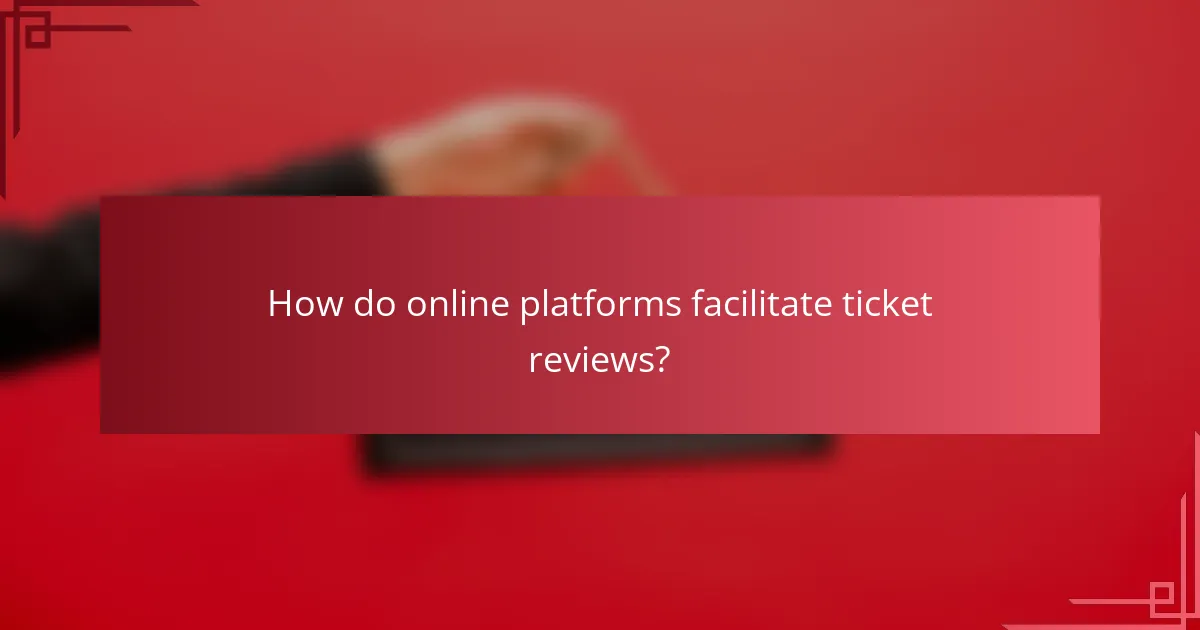
How do online platforms facilitate ticket reviews?
Online platforms enable ticket reviews by providing users with tools to share their experiences and opinions. These platforms often integrate social media, aggregate reviews from various sources, and offer event-specific feedback forms to enhance the ticketing experience.
Social media integration
Social media integration allows users to share their ticket experiences directly on platforms like Facebook and Twitter. This feature not only amplifies the reach of reviews but also encourages real-time feedback from friends and followers, creating a community-driven review environment.
For instance, when a user attends a concert, they can post their thoughts and photos instantly, influencing others’ decisions. This immediacy can lead to a more dynamic and engaging review process, fostering a sense of connection among attendees.
Review aggregation sites
Review aggregation sites compile user reviews from multiple platforms, providing a comprehensive overview of ticket experiences. These sites often categorize reviews by event type, location, or date, making it easier for potential buyers to assess the quality of events.
Popular aggregation sites like Yelp or TripAdvisor allow users to filter reviews based on ratings, helping them make informed decisions. Users should look for patterns in reviews, such as consistent praise or complaints, to gauge the reliability of an event before purchasing tickets.
Event-specific feedback forms
Event-specific feedback forms are tailored surveys that organizers send to attendees after an event. These forms typically ask for ratings on various aspects, such as venue quality, performer satisfaction, and overall experience, providing valuable insights for future events.
Organizers can use this feedback to improve future ticketing experiences, while attendees feel their opinions are valued. Users should take advantage of these forms to voice their thoughts, as constructive feedback can lead to enhancements in services and offerings.

What are the best practices for writing impactful reviews?
Writing impactful reviews involves providing constructive feedback that is clear, specific, and based on personal experiences. This approach helps others make informed decisions and enhances the overall ticket experience.
Include personal experiences
Sharing personal experiences makes your review relatable and credible. Describe specific situations, such as how a service met or failed to meet your expectations, to give readers a clearer picture.
For example, instead of saying “the service was good,” detail an instance where the staff went above and beyond to assist you. This adds authenticity and helps others understand the context of your feedback.
Rate specific aspects
Break down your review by rating specific aspects of the experience, such as customer service, ticket quality, and overall value. Using a scale, like 1 to 5 stars, can help convey your feelings more effectively.
Consider providing a brief explanation for each rating to clarify your reasoning. For instance, if you rate customer service a 4, you might mention that while the staff was helpful, there was a slight delay in response time.
Use clear language
Clear language is essential for effective communication in reviews. Avoid jargon and overly complex sentences; instead, use straightforward terms that anyone can understand.
For example, instead of saying “the ambiance was conducive to relaxation,” you could say “the atmosphere was calm and inviting.” This clarity ensures that your feedback is accessible to a wider audience.
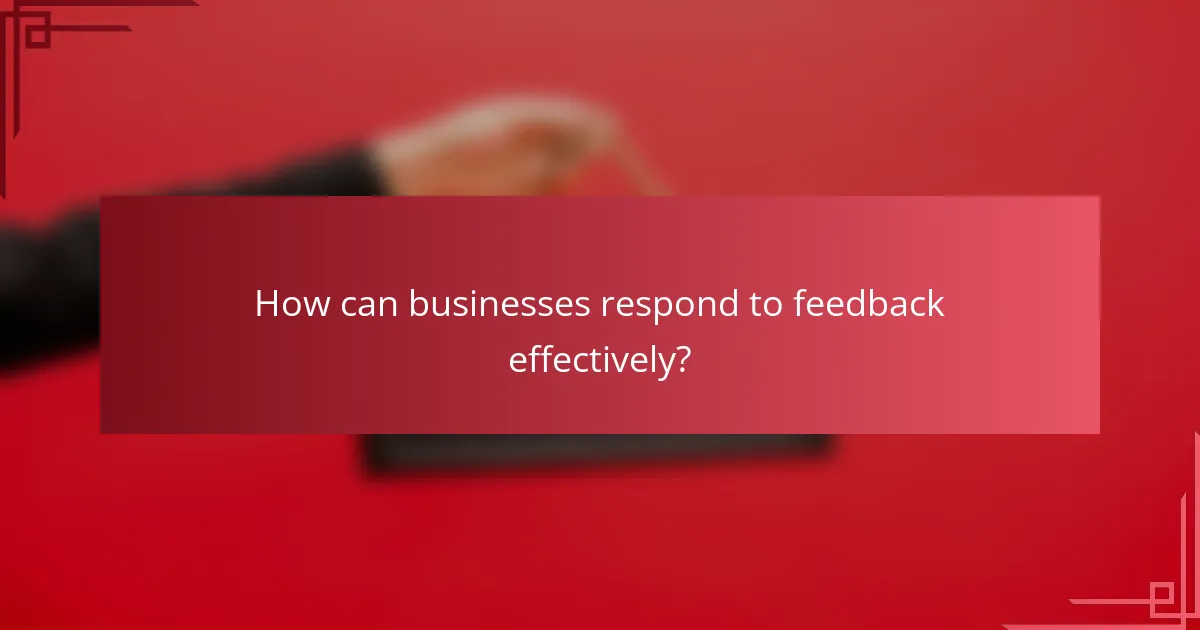
How can businesses respond to feedback effectively?
Businesses can respond to feedback effectively by actively engaging with reviewers and making necessary adjustments based on their insights. This approach not only improves customer satisfaction but also fosters loyalty and encourages more constructive feedback in the future.
Acknowledge and thank reviewers
Acknowledging and thanking reviewers is a crucial first step in responding to feedback. This simple act shows customers that their opinions are valued and encourages them to share their thoughts in the future.
Consider responding to reviews promptly, ideally within a few days. A personalized message that addresses specific points in the review can enhance the connection with the customer. For example, saying “Thank you for your feedback on our service; we appreciate your insights!” can go a long way.
Implement changes based on feedback
Implementing changes based on feedback demonstrates that a business is committed to improvement. This can involve adjusting products, services, or customer service practices based on the insights gathered from reviews.
Start by categorizing feedback into actionable items. For instance, if multiple customers mention slow service, consider training staff or optimizing processes. Regularly review feedback trends to identify common issues and prioritize changes accordingly.
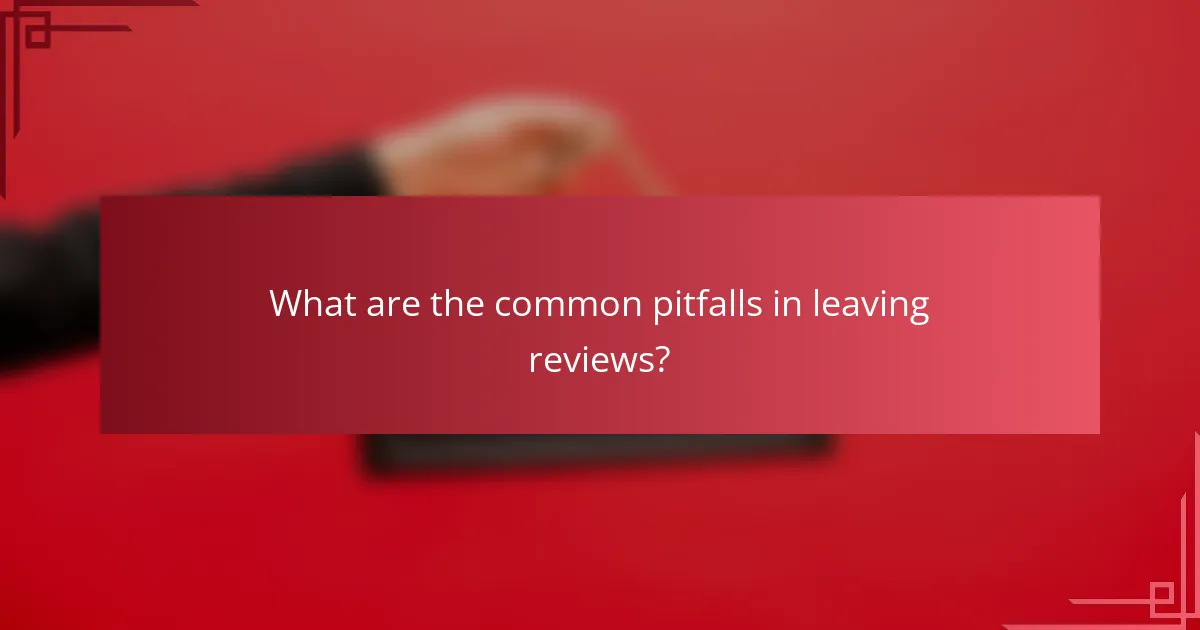
What are the common pitfalls in leaving reviews?
Common pitfalls in leaving reviews include being overly vague, focusing on irrelevant details, and failing to provide constructive feedback. These issues can dilute the value of the review and hinder others from making informed decisions.
Being overly vague
Vague reviews often lack specific details about the experience, making it difficult for others to understand the context. Instead of saying “it was great,” describe what made it great, such as the quality of service, the ambiance, or specific menu items.
For example, instead of stating “the food was good,” mention “the grilled salmon was perfectly cooked and seasoned.” This specificity helps potential customers gauge whether the experience aligns with their expectations.
Focusing on irrelevant details
Including irrelevant details can distract from the main points of the review. Focus on aspects that directly impact the experience, such as service speed, product quality, or value for money, rather than personal anecdotes that do not contribute to the overall assessment.
For instance, discussing the weather on the day of your visit may be less helpful than mentioning how the restaurant handled a busy evening. Stick to relevant observations to enhance the review’s usefulness.
Failing to provide constructive feedback
Constructive feedback is crucial for businesses to improve. Instead of simply stating what went wrong, offer suggestions for improvement. This approach not only helps the business but also provides valuable insights for other customers.
For example, if the service was slow, you might say, “The waiter was friendly, but it took a long time to receive our drinks. Perhaps they could streamline their ordering process during peak hours.” This type of feedback is actionable and beneficial for both parties.
